Related Research Articles

Idylls of the King, published between 1859 and 1885, is a cycle of twelve narrative poems by the English poet Alfred, Lord Tennyson which retells the legend of King Arthur, his knights, his love for Guinevere and her tragic betrayal of him, and the rise and fall of Arthur's kingdom.
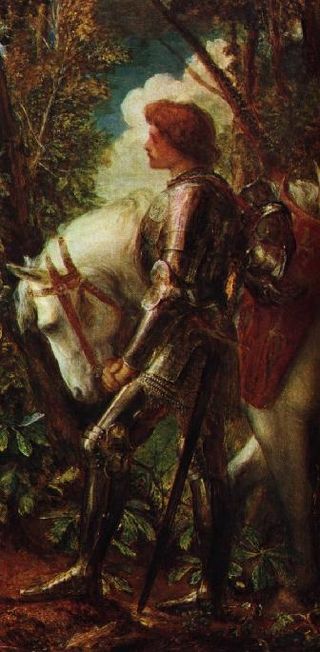
Galahad, sometimes referred to as Galeas or Galath, among other versions of his name, is a knight of King Arthur's Round Table and one of the three achievers of the Holy Grail in Arthurian legend. He is the illegitimate son of Sir Lancelot du Lac and Lady Elaine of Corbenic and is renowned for his gallantry and purity as the most perfect of all knights. Emerging quite late in the medieval Arthurian tradition, Sir Galahad first appears in the Lancelot–Grail cycle, and his story is taken up in later works, such as the Post-Vulgate Cycle, and Sir Thomas Malory's Le Morte d'Arthur.

The Lady of the Lake is a name or a title used by several either fairy or fairy-like but human enchantresses in the Matter of Britain, the body of medieval literature and mythology associated with the legend of King Arthur. She plays several important roles in many stories, including providing Arthur with the sword Excalibur, eliminating Merlin, raising Lancelot after the death of his father, and helping to take the dying Arthur to Avalon. Different sorceresses known as the Lady of the Lake appear concurrently as separate characters in some versions of the legend since at least the Post-Vulgate Cycle and consequently the seminal Le Morte d'Arthur, with the latter describing them as a hierarchical group, while some texts also give this title to either Morgan or her sister.

The Knights of the Round Table are the legendary knights of the fellowship of King Arthur that first appeared in the Matter of Britain literature in the mid-12th century. The Knights are an order dedicated to ensuring the peace of Arthur's kingdom following an early warring period, entrusted in later years to undergo a mystical quest for the Holy Grail. The Round Table at which they meet is a symbol of the equality of its members, who range from sovereign royals to minor nobles.

Bedivere is one of the earliest characters to be featured in the legend of King Arthur, originally described in several Welsh texts as the one-handed great warrior named Bedwyr Bedrydant. Arthurian chivalric romances, inspired by his portrayal in the chronicle Historia Regum Britanniae, portray Bedivere as a Knight of the Round Table of King Arthur who serves as Arthur's marshal and is frequently associated with his brother Lucan and his cousin Griflet as well as with Kay. In the English versions, Bedivere notably assumes Griflet's hitherto traditional role from French romances as the one who eventually returns Excalibur to the Lady of the Lake after Arthur's last battle.
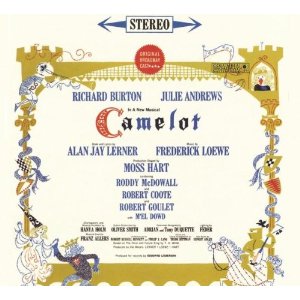
Camelot is a musical with music by Frederick Loewe and lyrics and a book by Alan Jay Lerner. It is based on the legend of King Arthur as adapted from the 1958 novel The Once and Future King by T. H. White.

King Arthur is a 2004 historical adventure film directed by Antoine Fuqua and written by David Franzoni. It features an ensemble cast with Clive Owen as the title character, Ioan Gruffudd as Lancelot and Keira Knightley as Guinevere, along with Mads Mikkelsen, Joel Edgerton, Hugh Dancy, Ray Winstone, Ray Stevenson, Stephen Dillane, Stellan Skarsgård and Til Schweiger.
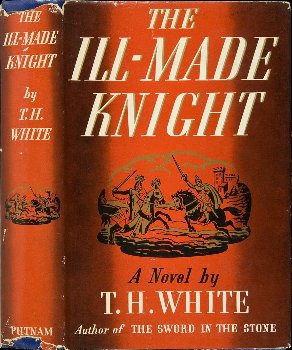
The Ill-Made Knight is a fantasy novel by British writer T. H. White, the third book in the series The Once and Future King. It was first published in 1940, but is usually found today only in collected editions of all four books of the novel.
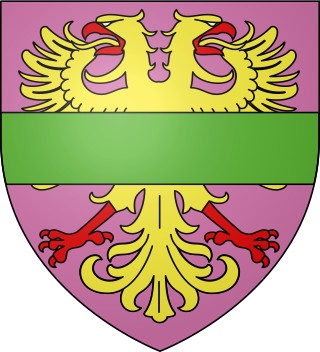
Sir Agravain is a Knight of the Round Table in Arthurian legend, whose first known appearance is in the works of Chrétien de Troyes. He is the second eldest son of King Lot of Orkney with one of King Arthur's sisters known as Anna or Morgause, thus nephew of King Arthur, and brother to Sir Gawain, Gaheris, and Gareth, as well as half-brother to Mordred. Agravain secretly makes attempts on the life of his hated brother Gaheris since the Vulgate Cycle, participates in the slayings of Lamorak and Palamedes in the Post-Vulgate Cycle, and murders Dinadan in the Prose Tristan. In the French prose cycle tradition included in Thomas Malory's Le Morte d'Arthur, together with Mordred, he then plays a leading role by exposing his aunt Guinevere's affair with Lancelot, which leads to his death at Lancelot's hand.
Sir Dagonet is a Knight of the Round Table in Arthurian legend. His depictions and characterisations variously portray a foolish and cowardly knight, a violently deranged madman, to the now-iconic image of King Arthur's beloved court jester.
This is a bibliography of works about King Arthur, his family, his friends or his enemies. This bibliography includes works that are notable or are by notable authors.

The Mists of Avalon is a 2001 television miniseries based on the 1983 novel of the same title by Marion Zimmer Bradley. Produced by American cable channel TNT, adapted by Gavin Scott, and directed by Uli Edel, the series is a retelling of the Arthurian legend with an emphasis on the perspectives of Morgan le Fay and other women of the tale. The first episode was the highest-rated original movie on basic cable in the summer of 2001.

Knights of the Round Table is a 1953 British adventure historical film made by MGM in England and Ireland. Directed by Richard Thorpe and produced by Pandro S. Berman, it was the first film in CinemaScope made by the studio. The screenplay was by Talbot Jennings, Jan Lustig and Noel Langley from Sir Thomas Malory's Le Morte d'Arthur, first published in 1485 by William Caxton.
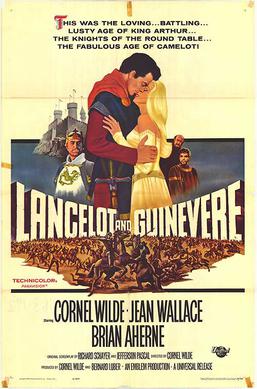
Lancelot and Guinevere is a British 1963 film starring Cornel Wilde, his real-life wife at the time, Jean Wallace, and Brian Aherne. This lesser-known version of the Camelot legend is a work shaped predominantly by Cornel Wilde, who co-produced, directed, co-wrote, and played Lancelot.

The Candle in the Wind is a fantasy novel by English writer T. H. White, the fourth book in the series The Once and Future King. Written in 1940, it was first published in 1958 in the collected edition. It deals with the last weeks of Arthur's reign, his dealings with his son Mordred's revolts, Guinevere and Lancelot's demise, and his perception of right and wrong.
The StanzaicMorte Arthur is an anonymous 14th-century Middle English poem in 3,969 lines, about the adulterous affair between Lancelot and Guinevere, and Lancelot's tragic dissension with King Arthur. The poem is usually called the Stanzaic Morte Arthur or Stanzaic Morte to distinguish it from another Middle English poem, the Alliterative Morte Arthure. It exercised enough influence on Thomas Malory's Le Morte d'Arthur to have, in the words of one recent scholar, "played a decisive though largely unacknowledged role in the way succeeding generations have read the Arthurian legend".

"The Broken Kingdom" is the fourth episode of the fifth season of the American fantasy drama series Once Upon a Time, which aired on October 18, 2015.

Unholy Grail is a horror comic book series written by Cullen Bunn and illustrated by Mirko Colak, published by American company AfterShock Comics. The colorist is Maria Santaolalla, and the letterer is Simon Bowland.
References
Footnotes
Bibliography
- Isaacs, Edith J. R. (1920). . In Rines, George Edwin (ed.). Encyclopedia Americana .